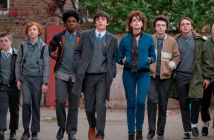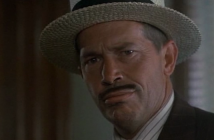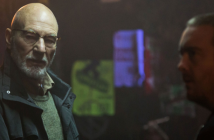Editor’s Note: Best of Enemies opens in limited release today, July 31, 2015.
Political and social tensions were high in 1968, and the Democratic and Republican conventions, slated for the dog days of summer, were expected to be hotbeds of controversy. The Democratic party was in crisis: President Lyndon B. Johnson had declined to run for reelection and Robert F. Kennedy, the Democratic frontrunner, had been assassinated just two months before the primaries. The Republicans, meanwhile, were giddy with success, Nixon banking on the Democratic party’s woes to allow a Republican victory, while Ronald Reagan laid the seeds for his future role as president.
Best of Enemies is the single best primer available about the television event that would quite literally change the face of network news.
It was in this climate that ABC, desperate for ratings, decided to give roughly 15 minutes a night to a debate between noted political and social commentators William F. Buckley and Gore Vidal. As Best of Enemies, the new documentary co-directed and co-written by Robert Gordon and Morgan Neville, shows, these debates were conflagratory from the very first moments. Full of interviews, articles and extended clips of the ten Buckley-Vidal debates, Best of Enemies is the single best primer available about the television event that would quite literally change the face of network news.

Both erudite, intelligent and tenacious, the conservative Buckley and the liberal Vidal hated each other with a fiery-hot passion. They had met prior to the debates and had formed solidly negative opinions of the other. After the debates, they would go on to pen essays and articles defending their positions. John Lithgow and Kelsey Grammer lend their voices for readings from these articles, and though the choice of Lithgow for Vidal and Grammer for Buckley seems almost too perfect in a gimmicky sort of way, their performances do not detract from the film, but rather add an understated charm.
The violent rhetoric, the ad hominem, the insults and the deliberate twisting of facts are all there. Best of Enemies does an exemplary job of showing how it all went down in 1968, and its impact on our sociopolitical culture today.
While the other networks had full coverage of the primaries during primetime in 1968, ABC, mostly broke and last in ratings, went with a limited two-hour nighttime slot instead. It was the kind of move that solidified their reputation as being low rent; the fact that ABC’s on-site set collapsed into a pile of curtains and plywood just before air time surely didn’t help. The Buckley-Vidal debates were a sort of Hail Mary pass for ABC designed to bring them notoriety and ratings. It worked, in part because of the ingenious and volatile way ABC directed the debates: during the Republican primaries, Buckley would defend Republican policies as the liberal Vidal criticized and questioned them, and for the Democratic primaries, their positions were reversed.
Best of Enemies is organized in a similar way, spending its first half on Buckley and its latter half on Vidal. On the surface this seems logical enough, but in practice, it does give Buckley what feels like a home court advantage, though it should be said that some of that apparent advantage is due to the availability of Buckley’s brother for interviews. Looking just like Buckley did in his later years and sharing many of the same vocal stylings, it’s the next best thing to having Buckley himself there.
It should also be said that Vidal was one of those people who never really garnered much of a loyal following, in part because he never hid that he was not heterosexual, and in part because he was absolutely vicious in his prose and debating style. He was intelligent and dogged, the kind of man who spent hours researching a topic, but also perfecting his appearance and practicing those sharp, allegedly ad-libbed bons mots. When it came time for the first of the 1968 debates with Buckley, he was eminently prepared.
Buckley, on the other hand, seemed to have gone into the debates with the assumption that he would just naturally be the smartest man in the room. In the first debate, you see a flustered Buckley only seconds into the segment already blurting out that Vidal was the author of the notorious novel Myra Breckinridge, as if that fact alone would win him all arguments now and in perpetuity.
The personal was, as they say, the political, and Buckley was determined to hang on to that to the bitter end, as the now-infamous episode in the ninth debate would prove. To an extent, Best of Enemies wants us to believe that poor Buckley was blind-sided by Vidal’s dirty tricks. At the same time, the examples the documentary gives of Buckley “elevating” political discourse or “demolishing” an opponent’s argument frequently show the exact opposite; this happens so often one starts to suspect a Democrat in the editing room.
The build-up in Best of Enemies to the spectacular, infamous moment of spew from Buckley said in retaliation for being called a crypto-Nazi is expertly crafted, and the responses from the interviewees to that moment are all classic. Dick Cavett, a witness to the moment in real time, is given the best response of all the interviewees, and that is exactly as it should be.
Political and ideological divides come and go, and the political schisms of 1968 were arguably the closest to what we’re experiencing today. Because so much was televised, and because so many Americans now alive also lived through these events, it’s easy for us in 2015 to relate to what happened during these debates nearly 50 years ago. Similarly, the comments Buckley and Vidal make will sound similar to anyone who has ever watched a political talk show in the last few decades. The violent rhetoric, the ad hominem, the insults and the deliberate twisting of facts are all there. Best of Enemies does an exemplary job of showing how it all went down in 1968, and its impact on our sociopolitical culture today.
Tense, fascinating and sometimes horrifying, Best of Enemies takes us into the minds of Gore Vidal and William F. Buckley, and proves that bad behavior always makes for good television.



